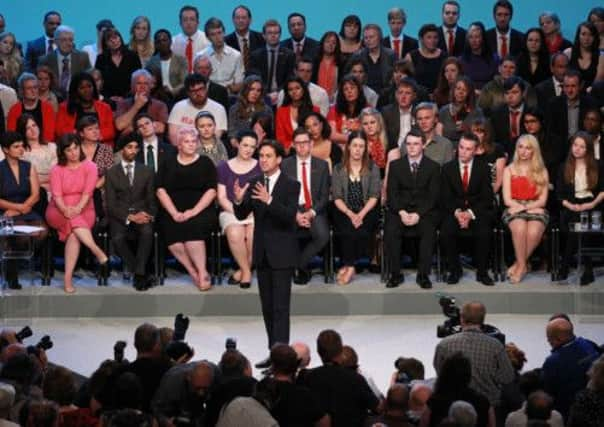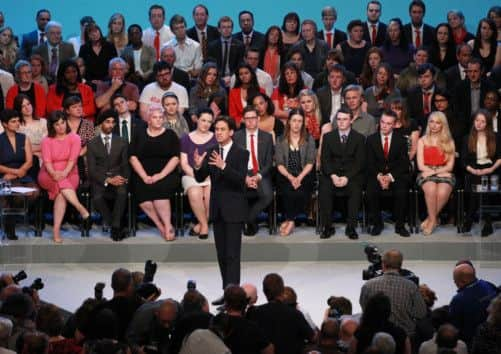Miliband targets big business as Labour gears up for 2015


The Labour leader used his party conference speech to set out a series of major policy announcements designed to put money back in the pockets of families and small firms while skimming it off Britain’s largest corporations.
In addition to his landmark pledge to freeze energy prices, the Doncaster North MP said he would introduce new laws that would allow the compulsory purchase of land from developers who refuse to press ahead with house-building
Advertisement
Hide AdAdvertisement
Hide AdReviving memories of both the pre-war construction of ‘garden cities’, and Gordon Brown’s ill-fated plan for a wave of new ‘eco-towns’, Mr Miliband said whole new settlements must be built across England to ensure the country has the houses it needs.


“If we carry on as we are, by 2020 there will be two million too few homes in Britain,” he said. “That is the equivalent of two cities the size of Birmingham. We have got to do something about it.
“We’ll say to private developers, you can’t just sit on land and refuse to build. We will give them a very clear message – either use the land or lose the land.
“We’ll identify new towns and garden cities, and we’ll have a clear aim that by the end of the Parliament Britain will be building 200,000 homes a year, more than at any time in a generation.”
Advertisement
Hide AdAdvertisement
Hide AdLabour made clear, however, that there would be no return to the top-down housing targets of the Blair/Brown era. Instead, communities and councils would be given incentives to develop the homes required.
The party announced the creation of a commission, headed by ex-BBC Trust chairman Sir Michael Lyons, that would draw up a “road map” for a major increase in home building. It will work with councils to identify prospective new towns and prepare a legislative framework for Labour to start building immediately.
Mr Miliband also unveiled his well-trailed plan to reverse the Government’s planned cut in corporation tax from 21 per cent to 20 per cent, scheduled for 2015.
Instead, he said, the money would be passed on to small business by cutting business rates in 2015, and then freezing them the following year.
Advertisement
Hide AdAdvertisement
Hide Ad“Since they came to office, the (Coalition) cut taxes for large business by £6bn – but raised taxes on small businesses,” Mr Miliband said. “I don’t think that’s the right priority. Yes, we need a competitive tax regime for large businesses, but frankly they’ve short-changed small business. I’m going to put it right.
“If Labour wins power in 2015, we will use the money that this Government would use to cut taxes for 80,000 large businesses to cut business rates for 1.5 million businesses across our country.”
Labour said the pledge would save the average business £450 over two years.
Set alongside his pledge to freeze energy prices, the three central policy announcements together marked a significant moment for Mr Miliband’s leadership as he at last sets out in concrete terms what his attack on “irresponsible capitalism” would mean.
Advertisement
Hide AdAdvertisement
Hide AdHe also used the speech to compare in colourful terms his own leadership style with that of David Cameron.
“When it was Murdoch versus the McCanns, he took the side of Murdoch,” Me Miliband said.
“When it was the tobacco lobby versus the cancer charities, he took the side of the tobacco lobby. When it was the millionaires who wanted a tax cut versus people paying the bedroom tax, he took the side of the millionaires.
“He may be strong at standing up to the weak, but he is always weak when it comes to standing up against the strong. That is the difference between me and David Cameron.”